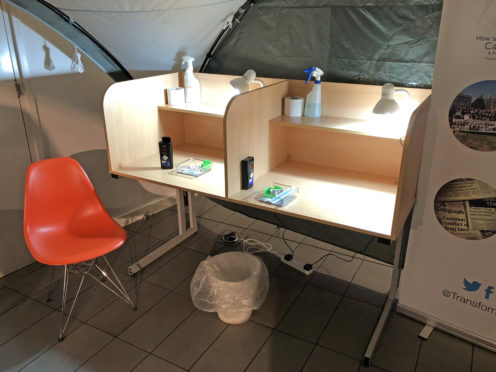
A majority of people in Scotland support setting up drug consumption rooms, according to new research.
Proposals to introduce Scotland’s first drug consumption room (DCR) in Glasgow, enabling people who inject drugs to do so in a safe and supervised environment, have been blocked by the Home Office.
The study, conducted by academics in Glasgow and Liverpool, questioned more than 1,500 people in Scotland and found 61% agreed with introducing the facilities, while 15% were against and 24% unsure.
Scientists randomly presented one of six different messages about the rooms to 1,591 people from across Scotland, designed to match the general Scottish population profile to ensure the study findings reflected the wider public’s views.
The research also revealed public sympathy for the proposal increases when they are given more information about the potential benefits for people such as families impacted by drug-related deaths.
Dr Andrew McAuley, a senior research fellow at Glasgow Caledonian University (GCU) and senior author of the report, said: “Harms related to drug use in Scotland are at record levels and Glasgow is at the epicentre with an ongoing HIV outbreak and some of the highest drug-related death rates in the country.
“This latest research not only suggests that Scots support DCRs but also that giving the public more information about the benefits of DCRs, such as reducing drug deaths among people who use them and also that they can save the NHS money because of the overdose deaths and infections that they prevent, would make them more supportive.”
Earlier this year, another study led by GCU researchers found 75% of people who inject drugs in Scotland would use DCRs, rising to 83% in Glasgow city centre.
Harry Sumnall, professor of substance use at Liverpool John Moores University and lead author of the latest study, said: “Although around 100 DCRs are in operation internationally, where they contribute to strategies to reduce drug-related deaths, DCRs are still seen as controversial in the UK.
“Our study findings show that not only is there good public support for DCRs in Scotland but, when some of the concerns that the public might have about them are addressed and the impact of drug-related deaths on families is explained, there is even greater support.”
He said the findings “can provide reassurance to decision-makers”.
Susanne Millar, chairwoman of Glasgow City Alcohol and Drug Partnership, which funded the study, said public support for drug consumption rooms “bolsters the unequivocal evidence of the urgent need for such a facility”.
Ms Millar, who is also interim chief officer for Glasgow City Health and Social Care Partnership, said: “The city’s health and social care partnership is ready to pilot a safer drug consumption facility as soon as Westminster agrees to make the legal changes required for us to do so legally.
“And that can’t come soon enough for the city as a whole and the thousands of families affected by addiction.”
The research paper is published in the International Journal of Drug Policy.

Enjoy the convenience of having The Sunday Post delivered as a digital ePaper straight to your smartphone, tablet or computer.
Subscribe for only £5.49 a month and enjoy all the benefits of the printed paper as a digital replica.
Subscribe © Peter Devlin
© Peter Devlin